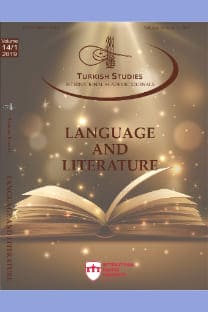ÇEVİRİ SÜRECİNDE GOOGLE TRANSLATE KULLANIMININ DEĞERLENDİRİLMESİ
Günümüz koşullarında çevirmenlerin çeviri sürecinde yararlandıkları ve süreci kolaylaştıran pek çok alternatif çeviri aracı ortaya çıkmaktadır. Bunda sürekli gelişen çeviri araçlarının ve dijital teknolojilerin önemi büyüktür. Bu araçların yanı sıra en son teknolojiyle donatılmış nöral makine çevirisi sistemleri gibi yeni çeviri sistemleri de geliştirilmeye devam etmektedir. Klasik araçlara alternatif olarak geliştirilen bu yeni çeviri sistemleri sürecin daha hızlı, daha kolay ve daha üretken tamamlanması adına olumlu bir adım olarak görünmektedir. Ancak söz konusu araçlar çevirmenin çeviri sürecinde daha detaylı bir araştırma ve tutarlı bir çeviri metin üretmesini sağlayabilecekleri gibi bazı açılardan çeviride anlam karmaşası, çeviri kalitesi vb. olumsuzluklara da neden olabilmektedir. Bu çalışmada çeviri sürecinde Google Translate kullanımı 10 katılımcı çevirmenin katıldığı bir anket üzerinden değerlendirilmiştir. Bu şekilde Google Translate motorunun çeviri sürecinde kullanımının olumlu ve olumsuz yönleri ortaya çıkarılmaya çalışılarak aynı zamanda çeviri sürecinde bu araca başvurmanın hangi açılardan etik olup olmadığı da tartışılmıştır. Çalışmada 10 katılımcıya ulaşılmasına rağmen elde edilen sonuçların gelişen literatür araştırıldığında yeterli olduğu düşünülmektedir. Böylelikle bu çeviri aracının çeviri sürecinde kullanımına yönelik bakış açıları ortaya çıkarılmak istenmiştir. Çeviribilim alanında yürütülen söz konusu çalışmanın benzeri çalışmalara katkı yapması umularak ilgili literatürü de zenginleştirmesi hedefler arasındadır. Zira özellikle bu çalışma çeviri sürecinde Google Translate kullanımına bir standart getirebilir.
AN EVALUATION OF THE USE OF GOOGLE TRANSLATE IN THE TRANSLATION PROCESS
In today's conditions, there are many alternative translation tools that help translators in the translation process and facilitate the translational action. Continously developing translation tools and digital Technologies in general play a great role at this point. These tools and also new translation like neural mchine translation systems equipped with the latest technologies continue to be developed day by day. These new translation systems that have been developed as an alternative tools to classical translation tools seem to be a positive step for the translation process to be completed faster, easier and more productively. However, though such tools may enable the translator to do a more detailed research and produce a coherent translated text in the translation process, they may also cause translation to be more confusing and may lower the translation quality and so forth. In this study, the use of Google Translate in the translation process was evaluated through a questionnaire attended by 10 participant translators to find out the positive and negative aspects of using this tool in the translation process by also discussing ethical issues. Though we can reach 10 translators to assess Google Translate, it is thougt that this numer is enough to reach general results as to the use of this translation tool when considered the developing literature. In this way, user perspectives on Google Translate were able to be acquired in a reasonable way. Last but not least, we also believe that this study carried out within Translation Studies is useful for similar research and is a gain to the related literature. Because this study may contribute to standardisation of Google Translate in the process of translating.
___
- Arslan, Edinç (2018), “Otomatik Çeviri Araçlarının Yabancı Dil Öğretiminde Kullanımı: Google Çeviri Örneği”, SEFAD, 2018 (39): s. 87-104.
- Bassnett, Susan (2002), Translation Studies (3rd edition), Routledge, Londra ve New York.
- Chen, Xuewei, Acosta Sandra ve Barry Etheridge (2016), “Evaluating the Accuracy of Google Translate for Diabetes Education Material”, JMIR Diabetes 2016, Cilt 1, Sayı 1, s.1-11.
- Ersoy, Hüseyin ve Balkul Halil İbrahim (2012), “Teknolojik Gelişmelerin Çevirmen ve Çeviri Mesleği Açısından Olumlu ve Olumsuz Etkileri: Çeviri Alanında Yeni Yaklaşımlar”, Akademik İncelemeler Dergisi (Journal of Academic Inquiries) Cilt/Volume: 7, Sayı/Number: 2, Yıl/Year: 2012, s.295-307.
- Korkmaz, İnönü (2019), “Makine Çevirisinin Kısa Tarihçesi”, Uluslararası Sosyal ve Beşeri Bilimler Araştırma Dergisi, Cilt:6, Sayı:32, s.155-166.
- Şahin, Mehmet ve Dungan Nilgün (2014), “Translation Testing and Evaluation: A study on Methods and Needs”, Translation & Interpreting Cilt 6 Sayı 2, s. 67-90.
- Pym, Anthony (2011), “What technology does to Translating”, Translation & Interpreting Cilt 3, Sayı 1, s.1-9.
- Wu, Yonghui vd. (2016), “Google's Neural Machine Translation System: Bridging the Gap between Human and Machine Translation”, https://arxiv.org/pdf/1609.08144.pdf Erişim: 11.03.2019
- “Nöral Makine Çevirisi”, https://translator.microsoft.com//help/articles/neural/ Erişim: 12.03.2019.
- https://www.nor10.com/google-translate-icin-buyuk-guncelleme-noral-makine-cevirisi/ Erişim: 21. 03.2019
- ISSN: 2667-5641
- Yayın Aralığı: Yılda 4 Sayı
- Başlangıç: 2006
- Yayıncı: ASOS Eğitim Bilişim Danışmanlık Otomasyon Yayıncılık Reklam Sanayi ve Ticaret LTD ŞTİ
Sayıdaki Diğer Makaleler
ÇEVİRİ SÜRECİNDE GOOGLE TRANSLATE KULLANIMININ DEĞERLENDİRİLMESİ
ÜSTKURGUSAL DÜZLEMDE ANLATILAR SERİSİ: ÜÇ ANLATI
ÇOCUK KİTAPLARINI ÇÖZÜMLEMEYE YÖNELİK BİR UYGULAMA: SAMED BEHRENGİ VE KÜÇÜK KARA BALIK ÖRNEĞİ
SEYİT ATEŞ, Kasım YILDIRIM, Fatih Çetin ÇETİNKAYA
TÜRKMEN TÜRKÇESİNDE NOKTALAMA İŞARETLERİNİN KULLANIMI
MEHDÎ-İ EHEVÂN-İ SÂLİS’İN ŞİİRİNİN GELİŞME SAFHALARI VE AYIRT EDİCİ YÖNLERİ
TRAVMANIN NESİLLER ARASI AKTARIMI: PATRICK MODIANO VE POST-BELLEK
ÇAĞATAY TÜRKÇESİNDEN ÖZBEK TÜRKÇESİNE ANLAM KÖTÜLEŞMESİ ÖRNEKLERİ
